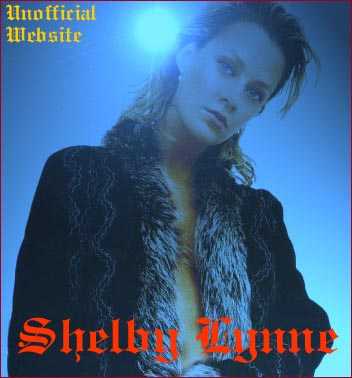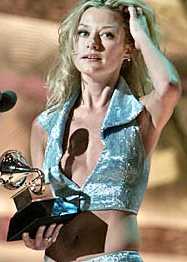DAVE'S DIARY - 28 APRIL 2004 - SHELBY LYNNE
SHELBY LYNNE RECOVERS WITH MUSIC
 |
Alabama
born balladeer Shelby Lynne had a horrific introduction to the perils
of music. Shelby awoke late one night almost 20 years ago as her drunken ex-Marine songwriter father Vernon shot her mother Laura, then himself, in a murder suicide. Shelby was just 17. Younger sister Alison Moorer, then 13, also witnessed the tragedy at their Franklinville home north of Mobile, Alabama. Shelby exorcised her grief by helping bring up her younger sister who later opted to live with their aunt. But Lynne, who dreamed of stardom since childhood, then headed to Nashville. |
"I wanted
to be a big star, but I didn't know how the system worked," Lynne
now 36 said, "That's why I started bucking the system, 'cause I didn't
know any better."
Lynne also tried solace in a short-lived marriage at 18.
"I was a baby when I married," recalled Lynne who played a saloon
singer with Shotgun Willie Nelson and Kris Kristofferson in 1991 movie
Another Pair Of Aces.
"It was like a trip out of town."
GEORGE JONES
Shortly afterwards the singer duetted with George Jones on If I Could
Bottle This Up and landed a deal with Sony after appearing on the
TNN Network.
"I think it's cool to make records when you're 18 years old with
Billy Sherrill and George Jones," she remembers warmly.
Lynne released three mainstream Epic albums Sunrise, Tough All Over
and Soft Talk with major producers Sherrill and Bob Montgomery.
She scored a couple of top-30 hits, I'll Lie Myself to Sleep and
Things Are Tough All Over.
Soft Talk, her final CD for Epic, contained a series of torchy
ballads that proved way too sombre for the mainstream.
She sang Tammy Wynette's Alive and Well and a trio of melancholy
numbers with self-explanatory titles - A Lighter Shade of Blue, I've
Learned to Live and the Max D Barnes tune You Can't Break a Broken
Heart.
Tough All Over sold 150,000 and Soft Talk chalked up sales
of 90,000 before she cut her swing album Temptation in 1993 with
Judds and Kathy Mattea producer Brent Maher.
But the record label Morgan Creek - also then home of Janis Ian - went
belly up so she cut her next album Restless for Magnatone in 1995.
Ms. Lynne stretched her creative muscles on Temptation.
It was a sunnier album, and she plunged into the writing process and ventured
into big-band swing and honky-tonk shuffles.
The record went nowhere, but Lynne had already re-evaluated her life and
career.
"I was getting older," she says. "I mean, when you're 18
you make your first record and you're a kid. Then you do the next record
and you're 20. And then the next one you're 22. By the time I got to Temptation,
I was in the middle 20s there going, I gotta get happy here or this is
not going to make any sense.' The songs were going that way because I
was changing, growing up into a woman."
NASHVILLE KISS OFF
| Lynne's
assessment of Nashville isn't complimentary. "It's kind of a box," she says. "And, boy, I don't like being in a box. So I had to mix up and confuse everybody as much as possible." By 1999 she was jaded by the industry that had spat her out and recorded her sixth album I Am Shelby Lynne for Island-Def Jam with producer Bill Bottrell of Sheryl Crow, Kim Richey and Madonna fame. The soul-flavoured departure - a decade after her debut disc - won her a Grammy as best new artist. In 1998, while living in a rented house in Mobile, Alabama, and suffering through a bad relationship, she began to write. The songs came fast and furious. |
 |
Life Is
Bad, the emotional centrepiece of I Am Shelby Lynne, started
as a poem and turned into a cathartic number.
Lynne followed up with the slicker and more pop-oriented Love, Shelby,
in 2001.
Produced by hit-maker Glen Ballard, it was filled with some exceptional
songs - most notably Killin' Kind.
Lynne then took time off away from the madness of the recording industry.
She stayed home and spent time reflecting and began writing the songs
that formed the nucleus of the sparse and relatively subdued eighth album
Identity Crisis.
The Capitol album features the single Telephone that debuts on
Nu Country TV.
"I take country with me," Lynne says of her latter day music.
"I can't help that. I'm a country girl. I wouldn't say I'm a country
singer, but I can do it. I just try to incorporate country with everything
else I love and see what happens."
Shelby's song Dreamsome is also in the new Ashley Judd movie Someone
Like You.
ALLISON MOORER - CD REVIEW 2003
MOORER MISTRESS OF MISS FORTUNE
"I take a pint of whiskey and crack open its lid/ I drink the bottle
empty just like my poor daddy did/ I take after my family, my fate's the
blood in me/ no-one grows old in this family/ we are a dying breed."
- Allison Moorer
 |
Don't
expect mirth and merriment from Alabama born diva Allison Moorer
- murder and melancholia are her strong suit. Although Moorer telegraphs her pastels from intro track Tumbling Down, replete with art metaphor, there are subtle plot pirouettes in the string stained Cold In California and teary Let Go. |
The singer breaks up her ruptured romance requiems with narcotic narrative
Ruby Jewel Was Here and organ drenched gospel fervour of vitriolic
vignette Hey Jezebel.
Ruby Jewel is a return to the period piece murder ballad - a staple
of roots country with a deluge of detail crammed into this novelette of
a hooker's daughter born in a bordello at the birth of the 20th century.
The victim delivers summary justice to a Wild West sheriff who deflowers
her at 12 in the bordello and is shot with the gun he used in his crime.
But frontier justice was not made for Hollyweird westerns and telemovies
back then.
BRUCE
ROBISON
All that is left after Ruby is hung from the gallows is her cell wall
graffiti - the song title.
Although subjects plunge to heavy-duty angst, Moorer and producer R S
Field (of Billy Joe Shaver and Webb Wilder fame) mine the mood with song
sequencing.
Moorer, co-writer of 12 of the 13 songs, collaborated with Kelly Willis's
singing spouse Bruce Robison on the jaunty Can't Get There From Here
that precedes the optimism of Steal The Sun and esoteric Up
This High.
Hey Jezebel - like Superwoman - is an oft-used song title (Chely
Wright had one on her last album) but the plot is a variation on the honky
tonk home wrecking vixen theme.
Moorer may regret uttering three words in No Place For A Heart
but finds liquid refuge for her sorrows - the blue moon taproom - in Yessiree.
So what about the music?
Well, the strings and horns may be a departure from Allison's past but
she doesn't go as pop as Shelby.
The singer bucks the star system without selling out to the pop pariahs
or the Music Row puppeteers who prey on malleable minstrels.
"They're told 'if you cut these songs, you'll have a radio hit,'
" Allison says of some peers, "which is, frankly, bullshit because
nobody knows what a hit is."
THE
HORSE WHISPERER
Moorer, rescued from demo singing when her tune A Soft Place To Fall
won an Oscar nomination in The Horse Whisperer, is realistic about
her goals.
"I really had no intentions of a solo career," says Allison
who wrote most tunes with Okie husband Butch Primm, "the music business
isn't fit for human beings, frankly."
But it beats slaving on farms or factories or trying to get airplay on
Australian radio.
Miss Fortune may appear to be a mistress of misery but if you let
her breathe gently after dark she may grow on you like many depression
refugees.
CD REVIEW - 2001
ALLISON CONQUERS THE HARDEST PART - MURDER
"The
night was hot and steamy and crickets played their tunes/ everyone was
sleeping under an August moon/ except one man that sat awake, slowly going
mad/ regretting that he had thrown away the only love he had/ a slave
to the bottle he had driven his family to leave/ a wife and two daughters
he treated so terribly/ drunk with grief and loneliness, he wasn't thinking
straight/ knew he couldn't live until they pardoned his mistake/ he went
into the city to try to make amends/ asked his love for pity but she would
not give in/ overwhelmed with sadness he reached for his gun/ and took
her life, along with his, before the morning sun/ now they are lying in
the cold, cold earth/ such a sad, sad story/ such a sad, sad world."
- Allison Moorer.
| When
Allison Moorer awoke late one night 15 years ago as her drunk songwriter
father Vernon shot her mother Laura, then himself, in a murder suicide
she was just 13. The tragedy, also seen by her sister Shelby Lynne, then 17, at their Franklinville home north of Mobile, Alabama, was so vivid in Allison's memory bank she exorcised her demons by writing a song about it. A sparse, haunting version of Sad, Sad Song is the emotive hidden track on Allison's second album The Hardest Part (MCA). Allison delivers the message with such primal passion it blows away even the most cynical critic. The hidden track is powerful - not just because of the personal subject matter - but because the stark delivery drives it deep into the listener's psyche. |
 |
Steve Earle
will be proud that Moorer, 28, has written a true-life murder ballad with
little chance of her peers surpassing.
But fans of Moorer and neutral observers will not be surprised - she's
one of the most powerful and passionate singers to emerge in the past
decade.
BUTCH PRIMM
Allison and
Oklahoma born husband Doyle "Butch" Primm wrote 10 of the 11
tunes on her debut disc Alabama Song and all 11 tracks here.
Ironically, Allison also shares an embryonic entree with Shelby - her
elder sister scored a movie role with Willie Nelson and Kristofferson
in Another Pair Of Aces.
And it was the Robert Redford movie The Horse Whisperer that launched
Allison when she played a honky tonk singer as she performed her evocative
tune A Soft Place To Fall.
It was no shock that was the first single released from the soundtrack
- by then Allison had landed her tune Bring Me All Your Loving on
Trisha Yearwood's eighth album Where Your Road Leads.
The University Of South Alabama graduate headed to Nashville where she
won acclaim for her role on a tribute concert for Walter Hyatt who died
in a plane crash after recording as Uncle Walt's Band and under his own
name with Lyle Lovett.
The Hyatt song Tell Me Baby is the only cover on her two albums
- a true, top shelf showcase for her evocative material.
Lonesome Bob joins Allison as duet vocalist on No Next Time that
precedes Feeling That Feeling - the entree for Sad, Sad Song.
BUDDY
MILLER
Producer Kenny Greenberg and Buddy Miller swap electric and acoustic guitars
with Allison on an album to be remembered long after the chart chaff and
Nash Trash dust is blown away by the ravages of Top 28 time.
Moorer ensures her artistic longevity by breaking the positive love song
cycle with pungent parables, kick started by the pathos propelled title
track that slices sorrow with sweet serration, Say You Said Goodbye,
It's Time I Tried and Best That I Can Do.
Myopic mainstream programmers won't know how to handle the spurned lover
in Think It Over who tells her cheating partner to rack off after
he cheats on a new lover and becomes a boomerang beggar to her.
No, the characters in Moorer songs are not frail femme fatales waiting
for limp lovers to return - they get on with their lives and loves.
Well, with one exception - the character in the latest single Send
Down An Angel calls upon winged intervention for advice and maybe
salient solace.
"It's nearly 3 am and still no sight of him/ when it comes to love
I'm in the dark/ Lord I don't understand why I stand by my man/ all he's
ever done is break my heart/ won't you send down an angel from the blue/
to show me the righteous thing to do."
But by the time the singer's character draws her line in the sand in No
Next Time and Feeling That Feeling Again she is back in her
strident saddle and taking no prisoners.
Buy The Hardest Part and you will learn why cerebral country artists
like Moorer deliver more.